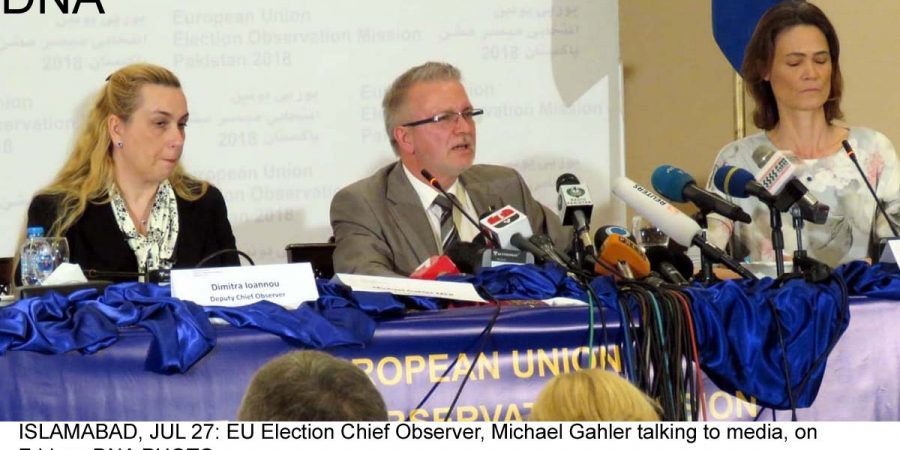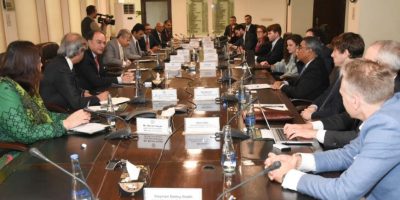EU observers say Pakistani military did not intervene in elections

ISLAMABAD, July 27 (DNA): The European Union Election Observation Mission chief Michael Gahler on Friday said that deputation of EU observers was delayed during Wednesday’s landmark general elections which affected the monitoring of electoral process.
Addressing a press conference, he said that results were still expected from several constituencies, however, this won’t damage the electoral process.
Gahler said that they do not have interest in the results but instead they have interest in the electoral process.
In its initial findings on this week s Pakistani parliamentary elections, the EU Election Observation Mission concluded that polling was relatively transparent, but raised the alarm on unfair pre-election practices.
The EU observer chief went on to say that Pakistani military had not interfered in the voting process.
“On election day, polling was assessed as well conducted and transparent,” he said. “However, counting was somewhat problematic with staff not always following the procedures.”
Meanwhile, the European Union Election Observation Mission (EU EOM) to Pakistan has concluded that positive changes to the legal framework were overshadowed by restrictions on freedom of expression and an unequal opportunity to campaign.
Media outlets and journalists suffered from restrictions which, the mission stated in a statement Friday, have resulted in self-censorship.
Positively, the EU EOM praised the work of the Election Commission of Pakistan (ECP) over the last few years. It complimented the ECP on the many initiatives that it had taken to improve accountability and transparency, including the participation of women and minorities. The mission said that levels of confidence in the ECP had undoubtedly increased due to regular consultations with political parties and civil society organisations.
Presenting the mission’s preliminary statement in Islamabad, the EU Chief Observer, Michael Gahler MEP (Germany), said: “Despite positive changes to the legal framework with the new Elections Act, and a stronger and more transparent Election Commission, we consider that the electoral process of 2018 was negatively affected by the political environment.”
On 25 July, over 120 EU observers observed the opening, voting, counting and tabulation processes at 582 polling stations and tabulation centres in 113 constituencies in Punjab, Sindh, Khyber Pakthunkhwa and Islamabad.
Voting was assessed as well-conducted and transparent. However, counting was somewhat problematic, with staff not always following procedures. In the polling stations observed, security personnel were present inside and outside all polling stations. However, as should be the case in a civilian exercise, the mission observed that it was the presiding officers who were in charge.
The EU EOM commented that, although there were several legal provisions aimed at ensuring a level playing field, there was a lack of equality of opportunity. Candidates with large political appeal and financial means, the so-called “electables” were reported to often dominate the campaign. Uneven rules on campaign spending further undermined candidates’ equal opportunity.
The head of the European Parliament’s delegation to the election observation mission, Jean Lambert MEP (United Kingdom), fully endorsed the preliminary statement of the EU EOM. She then addressed a number of issues relating to election day, including access to polling stations for voters with disabilities, and the participation of women in the elections.=DNA
============
Related News

IT, Agriculture sectors identified as key investment prospects in Pakistan
ISLAMABAD, MAY 6 /DNA/ – A delegation of International Investors called on Federal Minister forRead More

Pakistan’s progress on tobacco taxation still falls short of WHO guidelines
DNA Islamabad – Pakistan has made significant progress in raising tobacco taxes but the countryRead More


Comments are Closed